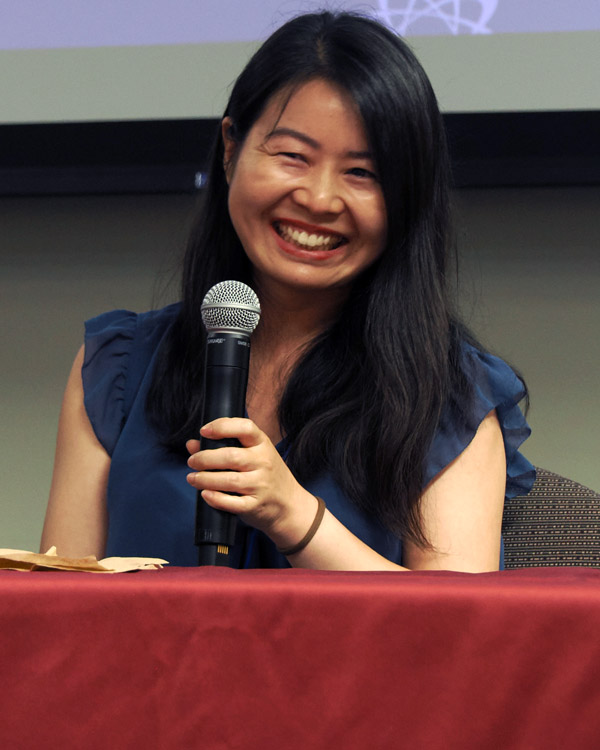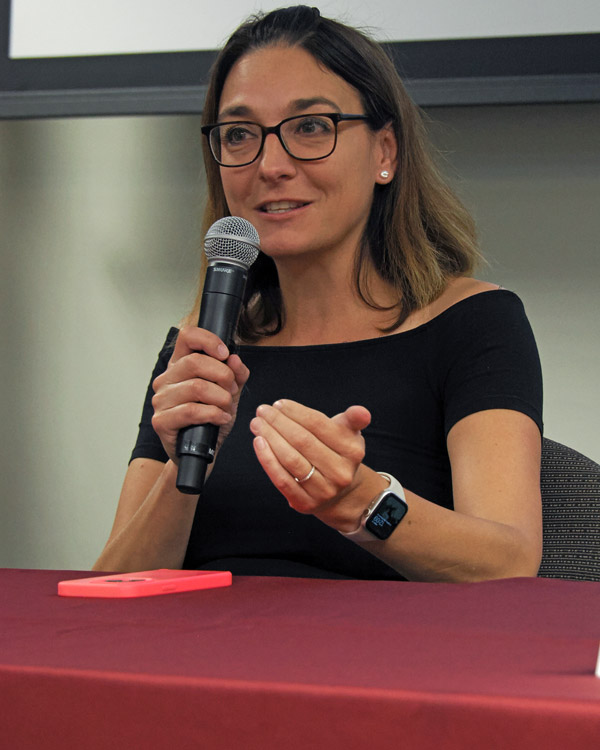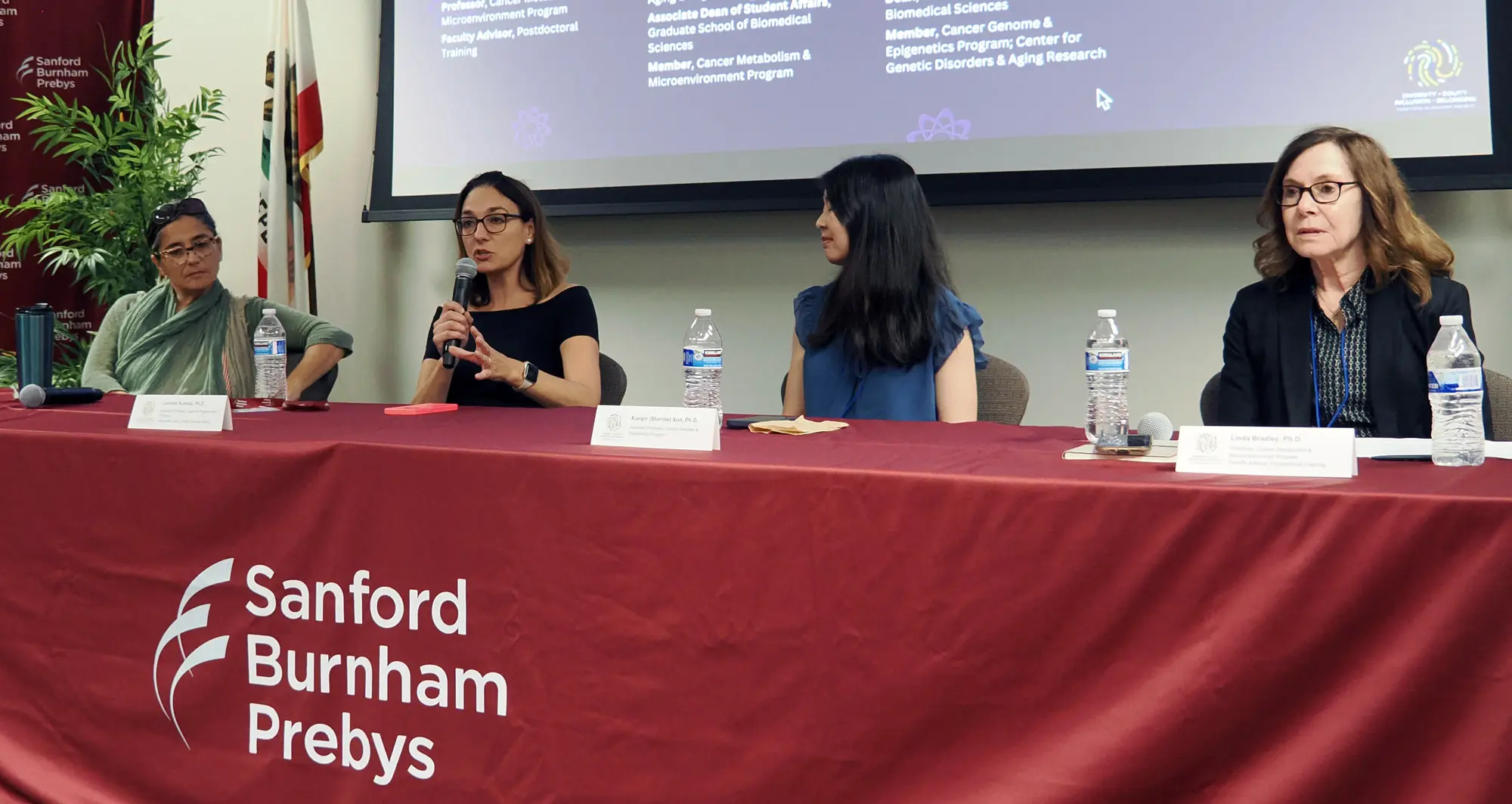Four panelists at different career stages shared insights and answered audience questions
Sanford Burnham Prebys held a Women in Science event on Monday, August 12, 2024. The session was in Fishman Auditorium on the Institute’s campus and focused on how female faculty members at different career stages have navigated their professional journeys in academia and the life sciences.
Eric Wang, PhD, an assistant professor in the Cancer Molecular Therapeutics Program at Sanford Burnham Prebys and co-chair of the Education and Training Diversity, Equity and Inclusion (DEI) Committee, opened the event and introduced the moderator, Shanshan Yin, PhD, a postdoctoral associate working in the lab of Peter D. Adams, PhD, and four panelists from Sanford Burnham Prebys:
- Linda Bradley, PhD, a professor in the Cancer Metabolism and Microenvironment Program
- Caroline Kumsta, PhD, an assistant professor in the Development, Aging and Regeneration Program and associate dean of Student Affairs of the Graduate School of Biomedical Sciences
- Alessandra Sacco, PhD, the director of the Development, Aging and Regeneration Program and dean of the Graduate School of Biomedical Sciences
- Xueqin (Sherine) Sun, PhD, an assistant professor in the Cancer Genome and Epigenetics Program

Shanshan Yin, PhD, is a postdoctoral associate working in the lab of Peter D. Adams, PhD. She was the panel discussion moderator.
Work and life balance
Yin asked the panelists to discuss how they balance their work and personal lives, and what strategies they use to restore their energy levels and maintain a positive mindset.
“I had to learn to manage my schedule, rather than letting it manage me,” said Kumsta. “I’ve gained a greater appreciation for stepping away from problems, and I often find that I come up with new solutions during or after hiking or working out, instead of by just working more and more.”
“Because I am setting up a new lab, it feels like I am working even more than I did as a postdoctoral fellow,” said Sun. “My persistence, curiosity and interest in the scientific process are the key drivers that are helping me as the lab gets up to speed.”
Caregiving
Yin followed this conversation by requesting that the panelists comment on the factors of childcare and family obligations throughout the careers of female faculty members.
“The childcare system for working parents in the U.S. leaves a lot of room for improvement,” said Bradley. “This has not improved through the course of my career, and it is something we think about a lot within the Postdoctoral Training Advisory Group as we discuss ways to improve the experience of postdoctoral fellows at the institute.”

Panelist Xueqin (Sherine) Sun, PhD, is an assistant professor in the Cancer Genome and Epigenetics Program.
“It can be hard to feel less productive as a scientist after having kids,” said Sun. “This is something we each have to navigate and there are no easy answers.”
Audience questions
Yin welcomed audience members to ask the panelists additional questions.
Sacco fielded a question about the balancing act of working long hours for short-term gain versus the increased risk of burnout. She said, “For me, this has really happened in phases. Some parts of certain experiments or application cycles require extra effort, and you have to learn when you can pull back and have a more balanced schedule.”
Kumsta answered a question about unrealistic expectations for postdoctoral fellows. She said, “I encourage every postdoc and principal investigator to have open and honest conversations about expectations for working hours, vacation time and weekend emails, among other topics. That won’t fix everything, but it will prevent a lot of uncertainty and build a foundation for addressing issues.”
The panelists had noted the strong representation of male scientists and staff members in the audience. Sacco responded to a question about what male scientists could do better to improve the environment for women in the field. She said, “We should all recognize our own biases, minimize their impact when making decisions, and be good listeners to other scientists’ needs.”
Gender and academic rank
The event closed with a conversation about gender disparities in academic ranks at research and higher education institutions. The panelists focused on the attrition than can occur after the end of postdoctoral fellowships as a major challenge for retaining women in academic science.
Kumsta explored some potential solutions that funders and institutions could consider. She said, “An extra year of funding for early-career female scientists and an extra year on the tenure clock may help us retain women and support their promotion from junior faculty positions. We also need to find ways to reward the extra administrative service that many female faculty members are asked to give on faculty committees.”

Panelist Caroline Kumsta, PhD, is an assistant professor in the Development, Aging and Regeneration Program and associate dean of Student Affairs of the Graduate School of Biomedical Sciences.
“I think certain things are getting better, but we need to do even more to retain women in the field,” said Sun. “The National Institutes of Health allowing time and budget for childcare costs in training grants was an important step.”
“Today’s event reminds us of the importance of speaking up,” said Sacco. “We can articulate and share our vision for a better tomorrow and work together to achieve it.”
The Women in Science event was hosted by the Education and Training DEI Committee at Sanford Burnham Prebys and supported by the Institute’s Diversity, Equity, Inclusion and Belonging (DEIB) Council and DEIB program manager, Lauren Mitchell.
